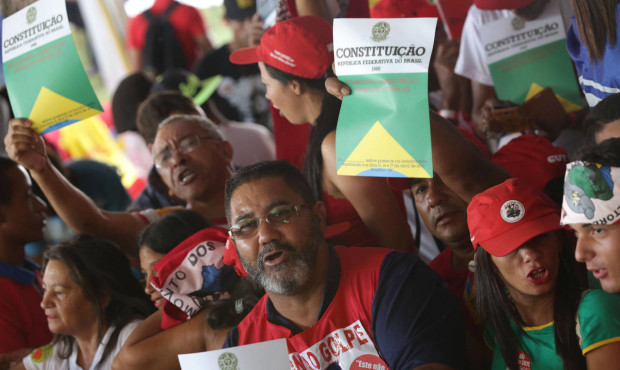AP
Rival camps reflect Brazil’s divide amid impeachment

Supporters shout slogans while holding images of the Brazilian Constitution, during a rally of Social Movements for Democracy, in a camp set up by supporters of President Dilma Rousseff in Brasilia, Brazil, Saturday, April 16, 2016. The lower chamber of Brazil's Congress on Friday began a debate on whether to impeach Rousseff, a question that underscores deep polarization in Latin America's largest country and most powerful economy. The crucial vote is slated for Sunday. (AP Photo/Eraldo Peres)
BRASILIA, Brazil (AP) — Separated by only a boulevard, two rival camps of demonstrators in Brazil’s capital underscore the sharp ideological divide that is playing out in Congress as lawmakers debate whether to oust the president.
On one side of Brasilia’s showcase Eixo Monumental, which cuts through the center of city and dead ends at Congress, several hundred impeachment supporters have pitched tents, their small but growing encampment festooned with Brazilian flags and the national anthem the soundtrack of choice.
They blame President Dilma Rousseff for the tanking economy and for the plague of corruption, which is reflected in the country’s high taxes and dismal public hospitals, schools and other basic services. They say a fresh start with a new president is the only hope for breathing life into an economy that’s expected to contract around 4 percent this year.
“We want change,” said Joao Pedro Netto, a pro-impeachment camper who spent more than 24 hours on a bus to reach Brasilia from his home in the central Minas Gerais state. “If Brazil continues like this, it’s going to sink.”
Across the boulevard, several thousand Rousseff supporters have pitched their own tent city, sleeping in hammocks and eating rice and beans served by volunteers at communal kitchens.
Largely union members and land reform activists, and overwhelmingly poor and dark-skinned, they have come by bus from across this continent-sized nation to defend Rousseff and her left-leaning Workers’ Party, which they credit for unprecedented improvements in their lives.
They denounce the impeachment debate in the nearby lower house of Congress, which is due to lead to a vote on Sunday, as a power-grab by the elite that saw its traditional privileges dim during 13 years of Workers’ Party rule.
The camp was the site of a raucous rally early Saturday as Rousseff’s predecessor and mentor, the charismatic former President Luiz Inacio Lula da Silva, delivered a rousing speech to the singing, chanting masses, casting the impeachment as bid to roll back the poor’s recent gains.
“It seems to me that the Brazilian elite doesn’t like democracy,” said the former leader, his sandpaper voice transformed into a gravelly growl by overuse. “When the poor started to climb up onto the social ladder, they were made uncomfortable.”
He was flanked by so many union and indigenous leaders, activists and party faithful that organizers urged people to leave the stage before it collapsed under their weight.
Sunday’s vote in the Chamber of Deputies will determine whether the impeachment proceeds to the Senate. Proponents need 342 of 513 votes, and tallies in the main Brazilian news outlets show them hovering near that number.
Rousseff is accused of violating Brazil’s fiscal laws to shore up public support amid a flagging economy. She says that such accounting has been common practice, insisting that she committed no crime and has repeatedly denouncing the attempt at impeachment as a “coup.”
“The proceedings against me that are being examined in Congress are nothing more than a fraud — the biggest political and judicial fraud in the history of our country,” Rousseff said in a pre-recorded address released late Friday on the Workers’ Party site and other websites.
In a signed article published Saturday in the Folha de S. Paulo daily, Rousseff said that “impeaching a president who has not committed a crime of responsibility is to rip the Brazilian constitution to shreds.”
The irony of the location of the pro-Rousseff camp wasn’t lost on its foes across the boulevard. The pro-government tents are pitched in the parking lot of Brasilia’s main soccer stadium, which underwent a $900 million facelift ahead of the 2014 World Cup, making it the world’s second most expensive stadium — despite the fact that Brazil’s capital does not have a top-division team to play in it.
This kind of wanton waste is just what has fueled anger against the government. The fight against corruption has been a rallying cry of the anti-Rousseff movement, fueling massive protests in recent months as an unfolding corruption probe centered around the state-run Petrobras oil company has exposed the extent of the rot.
While Netto and other pro-impeachment protesters want Rousseff out, many worry that the next batch of leaders would also be corrupt.
If the Chamber of Deputies sends the impeachment measure to the Senate and that body votes to open a trial against Rousseff, she would be suspended from office and Vice President Michel Temer would take over. Temer is implicated in the vast Petrobras corruption scheme. The next in line to take office after Temer is House Speaker Eduardo Cunha. He has been charged with money laundering and other crimes in the Petrobras scheme and is also implicated in other scandals.
The political crisis has dragged on for months, hamstringing attempts to revive the economy and battle an outbreak of the Zika virus even as Rio de Janeiro gears up to host the Olympics, in August.
Neither of the rival protesters expected the standoff to end shortly.
Both sides vowed to keep the encampments going until their side declares a definitive victory.
Copyright © The Associated Press. All rights reserved. This material may not be published, broadcast, rewritten or redistributed.






































